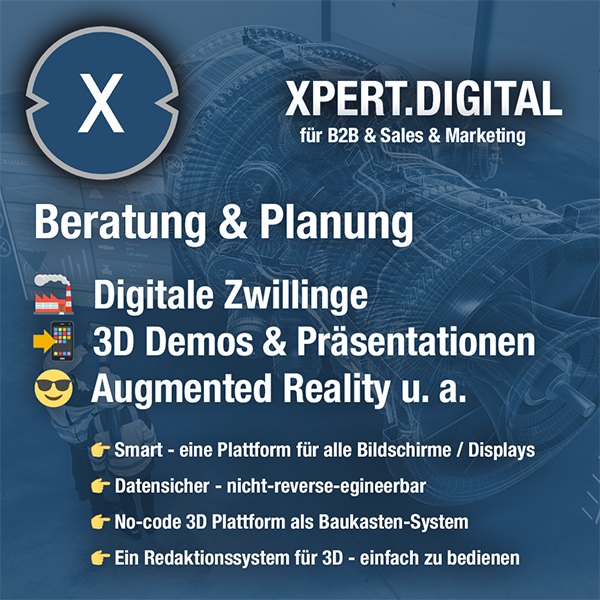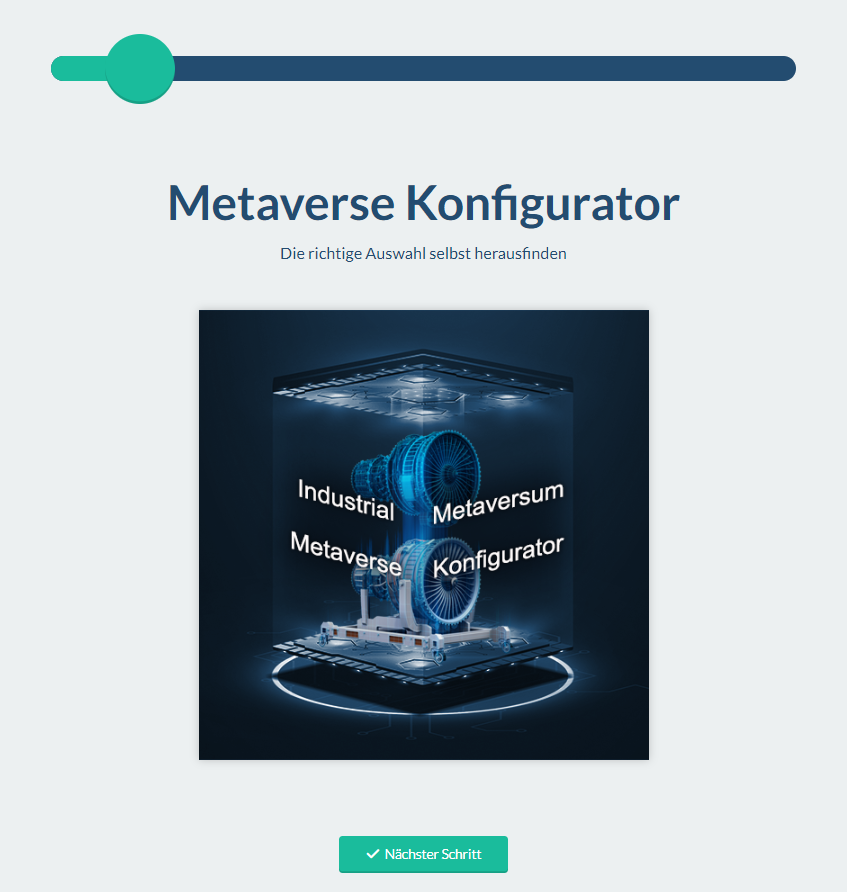Hybrid Marketing Metaverse – The Top 10 Questions, Answers and Solutions
Language selection 📢
Published on: June 30, 2023 / update from: June 30, 2023 - Author: Konrad Wolfenstein

Hybrid Marketing Metaverse – The Top 10 Questions, Answers and Solutions – Image: Xpert.Digital / popcorner|Shutterstock.com
What is Hybrid Marketing?
Hybrid marketing is a marketing strategy that combines different online and offline channels to create a seamless and consistent brand message and maximize customer engagement. It aims to leverage the benefits of both digital and traditional marketing to achieve greater reach and more effective communication with the target audience.
Hybrid marketing is about combining different channels such as social media, websites, email marketing, search engine marketing, print media, broadcast advertising, events and personal selling. By combining these channels, a coherent marketing strategy can be developed that leverages the strengths of each channel and creates synergies between them.
An example of hybrid marketing is using social media to generate awareness for an event and using printed flyers or posters to promote the event locally. Another option is to encourage customers to enter a contest on a website and then notify the winners via email or telephone.
The advantage of hybrid marketing is that it allows companies to target different audiences and spread their message in a variety of ways. It also offers flexibility as companies can adapt their marketing strategy to respond to customers' changing needs and preferences. By integrating online and offline channels, companies can create a richer customer experience and achieve their marketing goals more effectively.
Hybrid Marketing in, with and around the Metaverse
Hybrid marketing has developed further and is now closely linked to the emerging concept of metaverse and XR technologies. The metaverse refers to a virtual world that exists in parallel to the real world and enables people to dive into them and interact them. XR stands for “Extended Reality” and includes Virtual Reality (VR), Augmented Reality (AR) and Mixed Reality (MR).
The combination of hybrid marketing with the Metaverse and XR technologies opens up exciting opportunities for companies to take their marketing strategies to a new level. One of them is creating immersive and interactive brand experiences. Imagine a company hosting a virtual trade show in the metaverse, where visitors use their avatar identities to wander through exhibition halls and engage with virtual products and services. Through XR technologies, visitors can even immerse themselves in virtual worlds and experience products in 3D as if they were physically there. This creates a unique and immersive experience that captures the attention of the target audience.
Another application of hybrid marketing with the Metaverse and XR technologies is personalized advertising and customer interaction. Using data analytics and AI, companies can create individual profiles and send personalized advertising messages to customers' avatars in the metaverse. For example, a virtual clothing store can provide its customers with avatars that reflect their individual body shapes and styles. Customers can then try on garments virtually and receive recommendations based on their preferences. This personalized and immersive experience creates a strong bond between customer and brand.
In addition, hybrid marketing in the metaverse and with XR technologies also enables improved data analysis and success measurement. Companies can collect data about the behavior of their customers' avatars in the metaverse to gain insights into their preferences, interests, and purchasing habits. This data can be used to further optimize marketing strategies and develop personalized offers.
It is important to note that the Metaverse and XR technologies are still emerging and evolving. Nevertheless, companies have already started to explore hybrid marketing with these technologies and develop innovative approaches to connect with their target group.
However, there are also challenges and aspects that need to be taken into account. Integrating Hybrid Marketing with the Metaverse requires careful planning and choosing the right platforms and technologies to ensure a smooth and engaging brand experience. It is also important to protect user privacy and security and ensure that data analysis is conducted ethically and responsibly.
➡️ Hybrid marketing with the Metaverse and XR technologies presents exciting opportunities for companies to amplify their brand messages, delight customers and achieve their marketing goals. It is an area that will continue to grow in importance as the Metaverse and XR technologies continue to develop and integrate into the mainstream. Companies that jump on this bandwagon early and develop innovative approaches have the chance to strengthen their competitive position and differentiate themselves in the digital future.
Our Industrial Metaverse configurator
Just try out our universally applicable (B2B/Business/Industrial) Metaverse configurator for all CAD / 3D demo options:
Xpert (B2B/Business/Industrial) Metaverse configurator for all CAD / 3D data can be used on all devices, one platform!
Suitable for:
Hybrid marketing in, with and around the virtual showroom
Hybrid marketing has reached a new dimension in recent years with the development of XR technologies. An exciting application is the use of a virtual showroom as a special form of hybrid marketing. A virtual showroom combines the benefits of online and offline marketing by offering customers an immersive and interactive shopping experience.
A virtual showroom allows customers to explore products and services in a virtual environment as if they were physically in a store or exhibition. Using XR technologies such as virtual reality (VR) or augmented reality (AR), customers can view products in three dimensions, zoom in on details and even test functions. This creates an impressive level of realism and allows customers to check the product in more detail before purchasing and make an informed decision.
The advantages of a virtual showroom are obvious. Customers can shop from the comfort of their own home while enjoying an immersive shopping experience. You can view the products from different angles without having to physically go to a store. This is particularly attractive for customers who do not have access to a physical store, whether due to distance, pandemic restrictions or other circumstances.
In addition, a virtual showroom enables personalized and tailored customer interaction. Customers can indicate their preferences and receive recommendations for products that meet their individual needs and preferences. This can be made possible through intelligent algorithms and machine learning that analyze customer behavior and generate personalized offers.
Another interesting aspect of a virtual showroom is the possibility of using it as a venue for events, presentations or even fashion shows. Companies can invite customers to exclusive virtual events and offer them a unique experience. Customers can bring their avatars into the virtual showroom and interact with other participants. This creates a dynamic and lively atmosphere that stays with customers and enhances the brand experience.
However, implementing a virtual showroom requires careful planning and implementation. Companies need to choose the right XR technology that meets their needs and goals. For example, VR offers a fully immersive experience, while AR overlays the real world with virtual elements. The choice depends on the products, the target group and the available resources.
Companies also need to ensure that the virtual environment is user-friendly and allows for smooth navigation. An intuitive interface and clear instructions are crucial to ensure customers can easily use the virtual shopping experience.
A virtual showroom can also be combined with other hybrid marketing strategies to create a more complete customer experience. For example, companies can use social media channels to promote the virtual showroom and invite customers. Customers can also leave feedback and reviews about the products to encourage social interaction and engagement.
➡️ A virtual showroom as a special form of hybrid marketing offers exciting opportunities for companies to present their products and services and delight customers. It enables seamless integration of online and offline experiences, creating a unique brand experience. As XR technologies advance, the virtual showroom will undoubtedly play an important role in the marketing mix, helping companies reach their target audience and build long-term customer relationships.
10 application examples for hybrid marketing in the B2B sector
Virtual trade fairs and exhibitions
Instead of attending physical trade fairs, companies can set up virtual exhibition stands and showcase their products and services to a global audience. This can be supplemented with live presentations, virtual demos and interactive chats with potential customers.
Webinars and online training
Companies can offer web-based training and informative webinars to share their expertise and keep customers up to date on their products or industry trends. Interactive elements like live question-and-answer sessions can drive customer loyalty.
Personalized email marketing campaigns
Targeted email marketing allows companies to send customized emails with relevant content to potential customers. This can be achieved by segmenting the target audience and tailoring messages to the specific needs and interests of recipients.
Social media strategies
Companies can use their social media presence to interact with B2B customers, share relevant content, and position themselves as industry experts. This can be done through discussions in LinkedIn groups, Twitter chats, or sharing case studies and professional articles.
Influencer marketing
Companies can engage influencers from their industry to promote their products or services to a wider audience. Through recommendations from well-known personalities or industry experts, companies can increase their credibility and attract new customers.
Account Based Marketing (ABM)
ABM focuses on specifically addressing individual companies or customers. By combining personalized messages, tailored content and targeted advertising, companies can target decision-makers in potential customer companies and increase conversion rates.
Website optimization
Businesses can optimize their websites to provide a smooth and engaging user experience. This includes clearly presenting products and services, engaging content and making it easy for potential customers to contact you.
Content marketing
By creating high-quality content such as blog articles, white papers or case studies, companies can demonstrate their expertise and provide valuable information to potential customers. This promotes credibility and strengthens relationships with customers.
Online events and webcasts
Companies can hold virtual conferences, webcasts or expert panels to inform customers about industry trends, product innovations or best practices. These events offer the opportunity to interact and generate qualified leads.
Hybrid Marketing in the Metaverse
a) Virtual product presentations
Companies can showcase their products in the virtual space of the Metaverse and give customers the opportunity to experience them in an immersive environment. This can be made possible through XR technologies such as AR or VR.
b) Virtual training and workshops
Companies can offer virtual training and workshops in the Metaverse, where participants use their avatars to learn and interact together.
c) B2B virtual networks
Companies can create virtual spaces in the metaverse where B2B networks can be built. This allows professionals to meet in a virtual environment, exchange ideas and find potential business partners.
These examples show the wide range of applications of hybrid marketing in the B2B sector and how companies can use the different channels and technologies to optimize their marketing strategies and reach their target group.
10 application examples for hybrid marketing in the B2C sector
Augmented Reality (AR) product samples
Companies can use AR technologies to give customers the opportunity to try out products virtually. For example, customers can use an AR app to project makeup products onto their own faces to see what they would look like without having to physically try them on.
Geolocation and personalized offers
By using location data, companies can send targeted promotional offers or discounts to nearby customers. This can be done through mobile apps or notifications to alert customers in the area to special offers.
Influencer collaborations
Companies can work with influencers to promote their products or services to a wide audience. Through recommendations from influencers, companies can increase their reach and pique the interest of potential customers.
Social media live streams and Q&A sessions
Companies can conduct live streams on platforms such as Facebook, Instagram or YouTube to give customers the opportunity to interact with them directly. Questions can be asked and answered, product demonstrations can be carried out or special promotions can be offered. Q&A sessions, also known as question and answer sessions, are a form of interaction between companies and their target audience in a marketing context.
Gamification and competitions
Companies can incorporate playful elements into their marketing strategies to appeal to customers and strengthen their loyalty to the brand. This can take the form of competitions, virtual rewards or challenges.
Personalized email marketing campaigns
By segmenting audience and personalizing email marketing campaigns, companies can send customized offers and recommendations to customers based on their interests and purchasing habits.
Virtual events and concerts
Companies can organize virtual events and concerts where customers can participate via the internet. This allows customers to enjoy a special experience without being physically present.
Chatbots and AI-based customer interaction
Businesses can integrate chatbots into their online platforms to assist customers with questions, provide product information, and even process transactions. Artificial intelligence enables efficient and personalized customer interaction.
User-Generated Content (UGC)
Companies can encourage their customers to share content such as reviews, photos or videos of their products on social media platforms. This creates closer customer loyalty and ensures authenticity and credibility.
Hybrid Marketing in the Metaverse
a) Virtual pop-up shops
Companies can set up temporary virtual stores in the Metaverse where customers can discover, try and buy products.
b) Virtual brand events
Companies can host unique virtual brand events in the Metaverse where customers can experience exclusive content, offers and engagement opportunities.
c) Virtual Reality (VR) product presentations
Companies can use VR technologies to immerse customers in virtual worlds and provide them with an immersive experience as they explore and test products.
These examples show the diverse possible uses of hybrid marketing in the B2C sector and how companies can achieve effective customer loyalty and brand interaction by combining online and offline elements.
What is a Hybrid Metaverse?
A Hybrid Metaverse refers to a combination of the Metaverse and the real world. The Metaverse is a virtual, immersive universe inhabited by computer-generated environments and avatars. It is a concept inspired by science fiction literature and films and represents a connected, virtual reality in which users can interact, create and act.
However, a Hybrid Metaverse integrates the virtual world of the Metaverse with the real world by incorporating real physical elements and events into the virtual environment. This can be achieved, for example, by using augmented reality (AR) or mixed reality (MR), where digital content is projected into the real world.
A Hybrid Metaverse allows users to interact in a seamless environment where real people and objects come together with virtual elements and avatars. For example, a user could use AR glasses to obtain information about buildings while walking through a city, or place virtual objects in the real world and interact with them.
This combination of virtual and real world opens up a variety of application possibilities and expands users' experience and interactions. For example, companies can use hybrid Metaverse applications to virtually showcase products, conduct sales promotions, provide immersive training, or even host virtual events where real and virtual participants interact with each other.
The term “Hybrid Metaverse” also stands for the idea that various meta-verse platforms and virtual worlds are connected and create a common, interoperable environment in which users can act with each other of various platforms. This creates an extended and more comprehensive meta-verse experience that goes beyond individual platforms.
➡️ A Hybrid Metaverse connects the virtual and real worlds and opens up new possibilities for interaction, communication and business. It represents a fusion of technology, virtual worlds and the physical world, providing an enhanced and immersive experience for users and businesses.
For whom is a hybrid marketing metaverse worthwhile or makes sense?
A hybrid marketing metaverse can make sense for different players and industries.
Companies with physical products
Companies that make or sell physical products can use a hybrid marketing metaverse to create virtual showrooms or pop-up shops where customers can discover and experience their products. This allows companies to expand their reach and engage potential customers on a global scale, regardless of their location.
Retailers and e-commerce companies
Hybrid marketing in the metaverse can help retailers and e-commerce companies strengthen their online presence and provide an immersive shopping experience. By integrating AR or VR technologies, customers can virtually try out products before purchasing them, which can lead to higher purchase consideration and customer satisfaction.
Companies with services
Companies that offer services, such as tour operators, hotels or event planners, can use the Hybrid Marketing Metaverse to offer virtual previews, immersive virtual tours or virtual events. This allows potential customers to get a realistic impression of the services offered and make a better purchasing decision.
Creatives and artists
Creative industries such as art, design, fashion and entertainment can use the hybrid marketing metaverse to showcase their works or products and create new forms of interaction and engagement with their audience. Virtual exhibitions, fashion shows or immersive artist experiences can increase reach and engage audiences in innovative ways.
Event and conference organizer
Hybrid Marketing in the Metaverse can help event and conference organizers create a hybrid event experience where both real on-site attendees and virtual attendees can interact with each other via the Metaverse. This opens up new opportunities for global participation, expanded networking opportunities and virtual exhibition areas.
Educational institutions
Educational institutions can use the Hybrid Marketing Metaverse to offer immersive learning environments and virtual training. By integrating XR technologies, students can interact in virtual spaces, experience complex concepts and learn in innovative ways.
➡️ Not all companies or industries will benefit equally from the Hybrid Marketing Metaverse. Adopting such an approach requires careful analysis of the target audience, industry and specific goals of the company. It is also important to consider the target audience's technology requirements, costs, and willingness to participate in virtual experiences.
What other options are there besides hybrid marketing?
In addition to hybrid marketing, there are a variety of other marketing strategies and approaches that companies can use to reach their target audience and achieve their marketing goals.
Influencer marketing
Companies can work with influencers to promote their products or services to a wide audience. Influencers often have a dedicated following and can increase a brand's trust and credibility.
Content marketing
This strategy focuses on creating high-quality, relevant, and engaging content to capture the audience's attention and interest. This can be in the form of blog articles, videos, infographics or social media posts.
Social media marketing
By using social media, companies can connect directly with their audience, share content, encourage interaction and build customer relationships. This includes the use of platforms such as Facebook, Instagram, Twitter, LinkedIn and more.
Search engine marketing (SEM)
This strategy focuses on increasing a website's visibility in the search results of search engines such as Google. This can be done through paid advertisements (search engine advertising) or by optimizing the website for organic search results (search engine optimization).
Email marketing
Companies can use email to inform their customers about new products, offers or events. A personalized and targeted approach can increase the effectiveness of this marketing strategy.
Event Marketing: By organizing or participating in events, companies can showcase their brand, build relationships, and interact directly with potential customers. This can take the form of trade fairs, conferences, webinars or special events.
Guerilla marketing
This creative and unconventional marketing strategy aims to attract attention and create a strong brand presence. Guerrilla marketing often involves unusual and surprising promotions or stunts.
Mobile marketing
As more people use mobile devices, companies can target their marketing messages and promotions on mobile platforms such as apps, mobile websites or location-based services.
Community marketing
The focus here is on building an engaged community around the brand. Companies can use forums, social media groups or customer clubs to interact with customers, collect feedback and build brand loyalty.
Viral marketing
This strategy aims for a marketing message to spread through word of mouth and sharing content on social media. Creative and eye-catching content is developed to grab the attention of the target audience and make them share the message.
➡️ These are just a few examples of marketing strategies in addition to hybrid marketing. Depending on the target audience, industry, and company goals, a combination of approaches may be necessary to achieve the desired results.
In the age of the Internet, turbo-charged e-commerce and the advent of the metaverse age, do I still have a chance of staying in business without marketing or anything like that?
In the age of the Internet, turbo-charged e-commerce and the emerging metaverse age, the question arises as to whether it is even possible to stay in business without marketing or similar measures.
The short answer is: it is becoming increasingly difficult. Today's business environment is highly competitive and characterized by constant change. Companies must actively strive to remain visible and relevant in order to survive the competition.
Marketing plays a crucial role in promoting a brand, products and services, reaching target groups, attracting customers and building long-term relationships. It allows companies to communicate their messages, grab customers' attention and build trust.
Turbo e-commerce has revolutionized online commerce and allows companies to offer their products and services worldwide. However, this has also led to a crowded market where it is difficult to stand out from the crowd. Without marketing efforts, it can be difficult to increase visibility and attract the attention of potential customers.
The emergence of the Metaverse era presents new opportunities and challenges. The Metaverse promises an immersive virtual reality where people can interact, transact, and have different experiences. Companies that want to be present in the Metaverse must actively engage with it and develop appropriate marketing strategies to make their brand and their offerings known in this virtual world.
Effective marketing in the digital age can take different forms. This includes online marketing strategies such as search engine marketing (SEM), social media marketing, content marketing, influencer marketing and much more. Through targeted advertising, search engine optimization and the use of social media, companies can expand their reach and reach potential customers.
It is important to emphasize that marketing is not just reserved for large companies. Smaller companies and start-ups can also benefit from a targeted marketing strategy to establish themselves in their market segment and appeal to customers. Effective marketing can help companies gain visibility, highlight their unique selling points and build trust.
However, marketing is not the only component to staying in business. The quality of products and services as well as good customer service are also crucial. Companies must ensure that they provide value that meets the needs of their customers and keeps them satisfied. Satisfied customers can become loyal customers and provide positive recommendations, which in turn promotes the growth and success of the company.
➡️ Marketing in today’s business environment is essential. It allows companies to compete, increase brand awareness, attract customers and build long-term relationships. By employing effective marketing strategies, companies can maximize their opportunities and realize their growth potential in the era of the Internet, turbo-charged e-commerce, and the metaverse era.
Which marketing strategy is better?
The question of whether it is better in marketing to achieve a certain goal with a specified means or to implement as many goals as possible with a defined budget depends on various factors and there is no clear “better” or “worse”. It depends on the specific needs, goals and resources of the company.
If a company has a clearly defined goal, it may make sense to focus all available resources on achieving that goal. By focusing on a specific goal, you can tailor your marketing efforts accordingly and increase the likelihood of achieving that goal effectively and efficiently.
On the other hand, in some situations it can be beneficial to achieve as many goals as possible within a set budget. This is particularly relevant when a company has multiple marketing goals to pursue simultaneously. In this case, the budget is divided among different marketing activities to achieve a broader reach and address multiple objectives.
It is important to note that the effectiveness and efficiency of the marketing approach does not depend solely on the amount of resources available. Strategic planning, accurate audience analysis, selecting the right marketing channels, and continually measuring and adjusting results are crucial to ensuring the success of a marketing campaign, whether aimed at a specific goal or a broader objective.
➡️ Ultimately, the decision whether to focus on a specific goal or pursue multiple goals within a set budget should be made based on a comprehensive assessment of the company's goals, target audience, competitive situation and available resources. A well-thought-out and strategically focused marketing strategy is crucial to getting the most out of existing resources and achieving the desired results.

Xpert.Digital – Pioneer Business Development
I would be happy to serve as your personal advisor.
You can contact me by filling out the contact form below or simply call me on +49 89 89 674 804 (Munich) .
I'm looking forward to our joint project.
Xpert.Digital – Konrad Wolfenstein
Xpert.Digital is a hub for industry with a focus on digitalization, mechanical engineering, logistics/intralogistics and photovoltaics.
With our 360° business development solution, we support well-known companies from new business to after sales.
Market intelligence, smarketing, marketing automation, content development, PR, mail campaigns, personalized social media and lead nurturing are part of our digital tools.
You can find out more at: www.xpert.digital – www.xpert.solar – www.xpert.plus



























